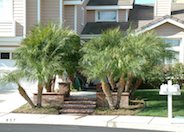
Common name:Pygmy Date Palm, Roebelin Palm
Botanical name:Phoenix roebelenii
This tree will grow to about 10' tall and has dark green, spiny petiole foliage. It does well in full sun to heavy shade; it likes moderate to heavy irrigation, but can take periods of dryness.
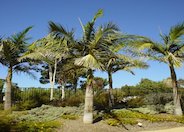
Common name:King Palm
Botanical name:Archontophoenix cunninghamiana
This is a beautiful palm which grows 40' or higher with a 10'-15' spread. The feathery leaves can grow 10' in length and are green above and gray beneath. It tolerates shade and can grow beneath tall trees for a long time if needed. It 's unique because it can be used as an indoor plant and will tolerate temperatures down to 28 degrees F.
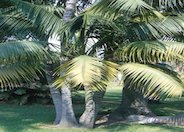
Common name:Kentia Palm, Paradise Palm
Botanical name:Howea forsteriana
This palm will reach about 60' tall and 20' wide and has long, drooping leaflets that are slender and deep green.
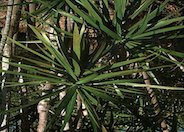
Common name:Red-Edged Chevron Plant
Botanical name:Dracaena marginata
This shrub will grow 6'-12' tall and has large, evergreen, leathery greenish red leaves.

Common name:Australian Tree Fern
Botanical name:Cyathea cooperi
This evergreen fern reaches a height of 10' with light green fronds that spread to a width of 15'. Its fronds are wider and held more horizontally than those of the Tasmanian fern tree. It requirs part shade to shade, with average to little summer watering. This plant performs well in containers, and is damaged by frost below 25 degrees F. -Monterey Bay Nursery
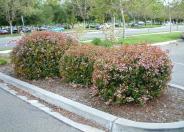
Common name:Indian Hawthorne or Rhaph
Botanical name:Rhaphiolepis indica
This small shrub will grow 2' tall and 4' wide. It has small, dark green leaves that get a red tint in the winter and deep pink flowers that bloom fall through spring.
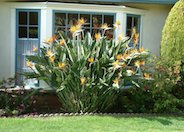
Common name:Bird Of Paradise
Botanical name:Strelitzia reginae
This shrub will grow to 6' tall and has large, gray green fronds with orange, blue, white, or multi-colored flowers that bloom throughout the year.
| Designer: Unknown | Orange and Blue 1 |
Photographer: GardenSoft |
Soils and Compost:
Practice grass-cycling by leaving short grass clippings on lawns after mowing, so that nutrients and organic matter are returned to the soil.
Water Saving Tip:
Mulching and adding compost to soil can minimize evaporation and help soil absorb and store water.
Integrated Pest Management:
Remove irrigation water and fertilizer from areas where you don't want weeds to grow.
